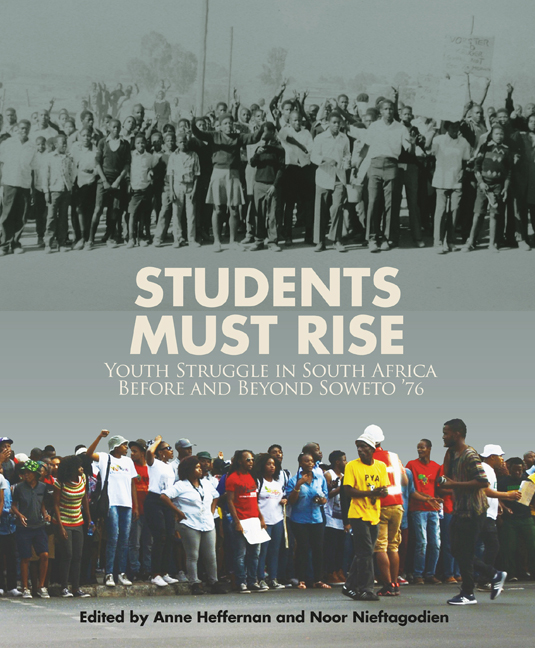Book contents
- Frontmatter
- Acknowledgements
- Contents
- Timeline
- Map Of South Africa
- Glossary
- Abbreviations
- Introduction: narratives of the student struggle
- Chapter 1 A brief history of the African Students’ Association
- Chapter 2 Youth and student culture: Riding resistance and imagining the future
- Chapter 3 The role of religion and theology in the organisation of student activists
- Chapter 4 Student organisation in Lehurutshe and the impact of Onkgopotse Abram Tiro
- Chapter 5 The University of the North: A regional and national centre of activism
- Chapter 6 Action and fire in Soweto, June 1976
- Chapter 7 What they shot in Alex
- Chapter 8 SASO and Black Consciousness, and the shift to congress politics
- Chapter 9 Youth politics and rural rebellion in Zebediela and other parts of the “homeland” of Lebowa, 1976–1977
- Chapter 10 My Journey, our journey: Activism at Ongoye University
- Chapter 11 ‘Let's begin to participate fully now in politics’: Student politics, Mhluzi township, 1970s
- Chapter 12 ‘They would remind you of 1960’: The emergence of radical student politics in the Vaal Triangle, 1972–1985
- Chapter 13 The ends of boycott
- Chapter 14 Fighting for ‘our little freedoms’: The evolution of student and youth politics in Phomolong township, Free State
- Chapter 15 ‘Every generation has its struggle’: A brief history of Equal Education, 2008–15
- Chapter 16 Contemporary student politics in South Africa: The rise of the black-led student movements of #RhodesMustFall and #FeesMustFall in 2015
- Selected Bibliography
Chapter 3 - The role of religion and theology in the organisation of student activists
Published online by Cambridge University Press: 21 April 2018
- Frontmatter
- Acknowledgements
- Contents
- Timeline
- Map Of South Africa
- Glossary
- Abbreviations
- Introduction: narratives of the student struggle
- Chapter 1 A brief history of the African Students’ Association
- Chapter 2 Youth and student culture: Riding resistance and imagining the future
- Chapter 3 The role of religion and theology in the organisation of student activists
- Chapter 4 Student organisation in Lehurutshe and the impact of Onkgopotse Abram Tiro
- Chapter 5 The University of the North: A regional and national centre of activism
- Chapter 6 Action and fire in Soweto, June 1976
- Chapter 7 What they shot in Alex
- Chapter 8 SASO and Black Consciousness, and the shift to congress politics
- Chapter 9 Youth politics and rural rebellion in Zebediela and other parts of the “homeland” of Lebowa, 1976–1977
- Chapter 10 My Journey, our journey: Activism at Ongoye University
- Chapter 11 ‘Let's begin to participate fully now in politics’: Student politics, Mhluzi township, 1970s
- Chapter 12 ‘They would remind you of 1960’: The emergence of radical student politics in the Vaal Triangle, 1972–1985
- Chapter 13 The ends of boycott
- Chapter 14 Fighting for ‘our little freedoms’: The evolution of student and youth politics in Phomolong township, Free State
- Chapter 15 ‘Every generation has its struggle’: A brief history of Equal Education, 2008–15
- Chapter 16 Contemporary student politics in South Africa: The rise of the black-led student movements of #RhodesMustFall and #FeesMustFall in 2015
- Selected Bibliography
Summary
South Africa is, and has long been, deeply religious. From the middle of the 1970s most people in South Africa were nominally members of various Christian denominations. Parts of South Africa experienced some of the most intensive missionary activity anywhere in the world. This rendered both a sizeable class of converted Africans, known as the amaKholwa in Natal, as well as breakaway, black-led churches that were known as Ethiopian churches, and which often meshed the new Christian gospel with elements of traditional African religion. Due to the dominance of Christianity in South Africa, it will be our primary focus in this chapter.
Until the apartheid government rolled out Bantu Education in 1954, Christian mission schools such as Healdtown and Lovedale College in the Eastern Cape, and Adams College and St Francis College in KwaZulu-Natal, were the primary educational avenue available to black South Africans. Whereas many churches decided to cede their schools to the government on the commencement of Bantu Education, others did not, and these remained very significant spaces in the schooling of black South Africans.
From the 1960s, religion took on an added significance for students as a covert language for engaging in political discussions, and churches became vital spaces of discussion and contact, as this chapter will discuss. This was because the apartheid government banned all black political parties after the Sharpeville Massacre of 21 March 1960 and other avenues for the discussion of political grievances were closed. The cumulative effect of government repression was to lay a pall of fear on the country that it took the period leading up to 1976 to overcome.
The significance of theology to the struggle was partly because apartheid was a doctrine propounded with a theological rationale. In this understanding, God was seen as the “Great Divider” who had ordained that there be distinct cultures and races. Apartheid, supposedly “separate but equal”, was the solution to maintaining each culture separately and thus ensuring God's will was satisfied. As such, apartheid had to be challenged theologically as well as politically. As we will see, theology was a deeply integral part of the language of student organisations in South Africa before the Soweto Uprising of June 1976.
- Type
- Chapter
- Information
- Students Must RiseYouth struggle in South Africa before and beyond Soweto ’76, pp. 24 - 33Publisher: Wits University PressPrint publication year: 2016



